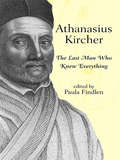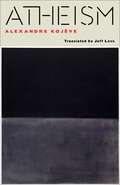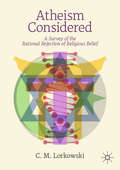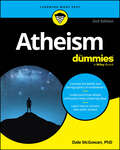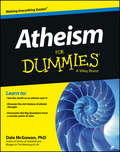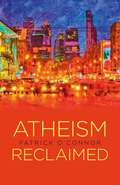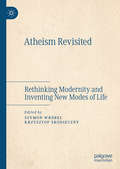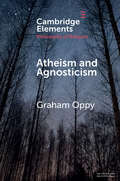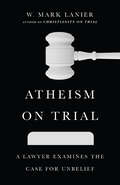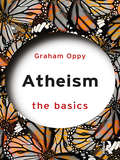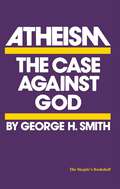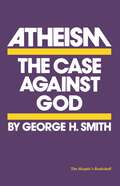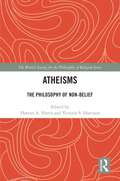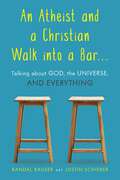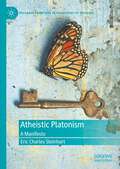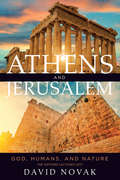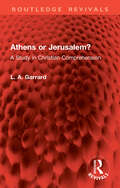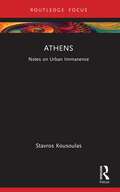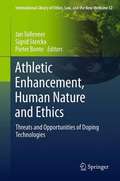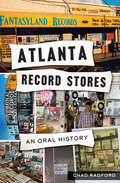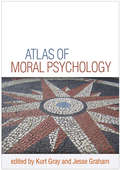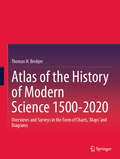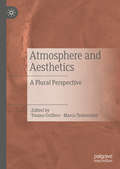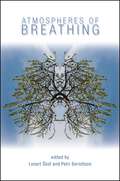- Table View
- List View
Athanasius Kircher: The Last Man Who Knew Everything
by Paula FindlenFirst published in 2004. Routledge is an imprint of Taylor & Francis, an informa company.
Athanasius Kircher: The Last Man Who Knew Everything
by Paula FindlenFirst published in 2004.Athanasius Kircher (1602-1680) -- German Jesuit, occultist, polymath - was one of most curious figures in the history of science. He dabbled in all the mysteries of his time: the heavenly bodies, sound amplification, museology, botany, Asian languages, the pyramids of Egypt -- almost anything incompletely understood. Kircher coined the term electromagnetism, printed Sanskrit for the first time in a Western book, and built a famous museum collection. His wild, beautifully illustrated books are sometimes visionary, frequently wrong, and yet compelling documents in the history of ideas. They are being rediscovered in our own time. This volume contains new essays on Kircher and his world by leading historians and historians of science, including Stephen Jay Gould, Ingrid Rowland, Anthony Grafton, Daniel Stoltzenberg, Paula Findlen, and Barbara Stafford.-
Atheism
by Alexandre KojèveOne of the twentieth century’s most brilliant and unconventional thinkers, Alexandre Kojève was a Russian émigré to France whose lectures on Hegel in the 1930s galvanized a generation of French intellectuals. Although Kojève wrote a great deal, he published very little in his lifetime, and so the ongoing rediscovery of his work continues to present new challenges to philosophy and political theory. Written in 1931 but left unfinished, Atheism is an erudite and open-ended exploration of profound questions of estrangement, death, suicide, and the infinite that demonstrates the range and the provocative power of Kojève’s thought.Ranging across Heidegger, Buddhism, Christianity, German idealism, Russian literature, and mathematics, Kojève advances a novel argument about freedom and authority. He investigates the possibility that there is not any vantage point or source of authority—including philosophy, science, or God—that is outside or beyond politics and the world as we experience it. The question becomes whether atheism—or theism—is even a meaningful position since both affirmation and denial of God’s existence imply a knowledge that seems clearly outside our capacities. Masterfully translated by Jeff Love, this book offers a striking new perspective on Kojève’s work and its implications for theism, atheism, politics, and freedom.
Atheism Considered: A Survey of the Rational Rejection of Religious Belief
by C.M. LorkowskiAtheism Considered is a systematic presentation of challenges to the existence of a higher power. Rather than engage in polemic against a religious worldview, C.M. Lorkowski charitably refutes the classical arguments for the existence of god, pointing out flaws in their underlying reasoning and highlighting difficulties inherent to revealed sources. In place of a theistic worldview, he argues for adopting a naturalistic one, highlighting naturalism’s capacity to explain world phenomena and contribute to the sciences. Lorkowski demonstrates that replacing theism with naturalism, contra popular assumptions, sacrifices nothing in terms of ethics or meaning. Instead, morality ultimately proves more important than religion and does not rely on it. Appropriate for classroom use, this book is meant to cultivate understanding, tolerance, and fruitful dialogue between believers and nonbelievers.
Atheism For Dummies
by Dale McGowanAn unintimidating guide to Atheism and secular philosophy Atheism For Dummies, 2nd Edition takes an unbiased look into the philosophical worldview of the lack of belief in gods. This approachable book showcases how atheism is a spectrum, from showing the secular values and lifestyles that resonate with many atheists to also showing how atheism can connect to other philosophical views such agnosticism, secular humanism, and more. Learn about the deep history of atheism, how atheism appears in popular culture, and how atheist philosophy and perspective can apply to topics like artificial intelligence and the climate crisis. Explore what atheism is and isn't Examine the beliefs of nonbelievers Discover atheist perspective on important philosophical questions Find out how the internet has shaped atheism and secular communities If you're looking for a stronger understanding of religious nonbelief, Atheism For Dummies, 2nd Edition is the accessible guide for you.
Atheism For Dummies
by Dale McgowanThe easy way to understand atheism and secular philosophyFor people seeking a non-religious philosophy of life, as well as believers with atheist friends, Atheism For Dummies offers an intelligent exploration of the historical and moral case for atheism. Often wildly misunderstood, atheism is a secular approach to life based on the understanding that reality is an arrangement of physical matter, with no consideration of unverifiable spiritual forces.Atheism For Dummies offers a brief history of atheist philosophy and its evolution, explores it as a historical and cultural movement, covers important historical writings on the subject, and discusses the nature of ethics and morality in the absence of religion.A simple, yet intelligent exploration of an often misunderstood philosophyExplores the differences between explicit and implicit atheismA comprehensive, readable, and thoroughly unbiased resourceAs the number of atheists worldwide continues to grow, this book offers a broad understanding of the subject for those exploring atheism as an approach to living.
Atheism Reclaimed
by Patrick O'ConnorA Lament for the Soul of Atheism. Real Atheism for Real Atheists. Rooted in continental philosophy, phenomenology and existential philosophy, Atheism Reclaimed is original in its attempt to create different existential concepts to give expressions to what an authentic atheism might look like for the 21st Century. Utilizing thinkers like Heidegger, Nietzsche, Bataille and Ranciere, Virno and Sartre, Patrick O,Connor opens up a new path for atheist thought based on questions of time, truth, objects and equality in opposition to more traditional scientific materialist accounts that underline conventional atheism. O'Connor engages with five key moments that, he argues, allow us to begin to build a new conceptual discourse for atheism: Nietzsche's response to nihilism; the role of objects; an atheistic interpretation of Heidegger's account of time; the strange relation between truth and violence; and a refiguring of notions of the common.
Atheism Revisited: Rethinking Modernity and Inventing New Modes of Life
by Szymon Wróbel Krzysztof SkoniecznyAtheism Revisited is a collection of essays that explore the multifaceted nature of atheism. Starting from the notion that today’s atheism is shaped by the defining processes of Modernity—such as secularization and the breakup of science, philosophy, and theology—the first part of the book undertakes a thorough scrutiny of Modern atheisms, from Spinoza and Hobbes to Marx and Nietzsche. The second part of the book seeks to draw practical conclusions from this scrutiny and answer the questions: what is the state of atheism today? What is the role of an atheist in a world affected by religious fundamentalisms? What should the relationship between atheists and religious people look like? The wide scope of the book allows readers to see atheism as a central concern of many intellectual movements, from Marxism and French Theory to post-secularism and the reevaluation of Modernity, and to understand atheism as a focal point of the most important contemporary philosophical debates.
Atheism and Agnosticism (Elements in the Philosophy of Religion)
by Graham OppyThis book is an elementary introduction to atheism and agnosticism. It begins with a careful characterisation of atheism and agnosticism, distinguishing them from many other things with which they are often conflated. After a brief discussion of the theoretical framework within which atheism and agnosticism are properly evaluated, it then turns to the sketching of cases for atheism and agnosticism. In both cases, the aim is not conviction, but rather advancement of understanding: the point of the cases is to make it intelligible why some take themselves to have compelling reason to adopt atheism or agnosticism.
Atheism on Trial: A Lawyer Examines the Case for Unbelief
by W. Mark LanierIn the courtroom, lawyers depend on rules of evidence to make their arguments. A case is made by establishing certain facts from which proof can be determined. But what happens when the truth seems to be a matter of faith? Can the legal mind discern the validity of one's belief or unbelief? Nationally recognized trial lawyer Mark Lanier turns his analytical mind to the arguments for atheism and agnosticism. With critical thinking and precision of thought, he examines the rationales made for unbelief and assesses them on their own terms, finding points of strength and weakness in their logic and coherence. He considers whether atheistic frameworks give satisfactory and consistent explanatory answers for understanding human existence and the world around us. He cross-examines the strongest arguments of prominent atheists and also interrogates the questions of agnostics as to whether God is knowable. Through his evenhanded, levelheaded approach, Lanier challenges us all to decide for ourselves what we believe.
Atheism: The Basics (The Basics)
by Graham OppyAtheism: The Basics is a concise and engaging introduction to belief in the non-existence of deities. Atheism has long fascinated people but debate around this controversial position may seem daunting. In this lively and lucid book, Graham Oppy addresses the following important questions: • What does it mean to be an atheist? • What is the difference between atheism, agnosticism, theism and innocence? • How has atheism been distributed over time and place? • What does science tell us about atheism? • Are there good reasons to be an atheist? • Are there good reasons not to be an atheist? • What do we mean by ‘new atheism'? With a glossary of key terms and suggestions for further reading throughout, the book considers key philosophical arguments around atheism, making this an ideal starting point for anyone seeking a full introduction to the arguments between those who hold atheistic beliefs and those who do not.
Atheism: The Case Against God
by George H. SmithGeorge H. Smith sets out to demolish what he considers the most widespread and destructive of all the myths devised by human beings - the concept of a supreme being. With painstaking scholarship and rigorous arguments, Mr. Smith examines, dissects, and refutes the myriad "proofs" offered by theists - sophisticated, professional theologians - as well as the average religious layman. He explores the historical and psychological havoc wrought by religion in general and concludes that religious belief cannot have any place in the life of modern, rational man. "It is not my purpose to convert people to atheism . . . (but to) demonstrate that the belief in God is irrational to the point of absurdity. If a person wishes to continue believing in a god, that is his prerogative, but he can no longer excuse his belief in the name of reason and moral necessity."
Atheism: The Case Against God
by George H. SmithGeorge H. Smith sets out to demolish what he considers the most widespread and destructive of all the myths devised by human beings - the concept of a supreme being. With painstaking scholarship and rigorous arguments, Mr. Smith examines, dissects, and refutes the myriad "proofs" offered by theists - sophisticated, professional theologians - as well as the average religious layman. He explores the historical and psychological havoc wrought by religion in general and concludes that religious belief cannot have any place in the life of modern, rational man."It is not my purpose to convert people to atheism . . . (but to) demonstrate that the belief in God is irrational to the point of absurdity. If a person wishes to continue believing in a god, that is his prerogative, but he can no longer excuse his belief in the name of reason and moral necessity."
Atheisms: The Philosophy of Non-Belief (The British Society for the Philosophy of Religion Series)
by Victoria S. Harrison Harriet A. HarrisQuestions about how to negotiate belief and non-belief in social and public spheres are attracting an increasing amount of attention from academics in a range of disciplines, and from concerned members of the public. This volume addresses the emergence of ‘new atheism’ and the developing ‘spiritual but not religious’ phenomenon. Avoiding simplistic accounts of atheism, and of religious belief, it provides readers with insight into a wide range of nuances within theism and atheism, as well as spiritual practice and faith. The chapters by an international panel of contributors focus on topics such as: a typology or cartography of atheisms and agnosticism; contrasting types of atheism within Christianity and Buddhism; questions about cognitive and doxastic stances in atheisms; theist rejections of and atheist embracing of ‘God’; and atheist aesthetics. Reaching beyond the Christian tradition, the book will be of particular interest to scholars of the philosophy of religion, as well as religious studies and theology more generally.
Atheist and a Christian Walk into a Bar: Talking about God, the Universe, and Everything
by Justin Schieber Randal RauserThe question of God is simply too important--and too interesting--to leave to angry polemicists. That is the premise of this friendly, straightforward, and rigorous dialogue between Christian theologian Randal Rauser and atheist Justin Schieber. Setting aside the formality of the traditional debate, the authors invite the reader to join them in an extended, informal conversation. This has the advantage of easing readers into thorny topics that in a debate setting can easily become confusing or difficult to follow. Like any good conversation, this one involves provocative arguments, amusing anecdotes, and some lively banter. Rauser and Schieber begin with the question of why debates about God still matter. They then delve into a number of important topics: the place of reason and faith, the radically different concepts of God in various cultures, morality and its traditional connection with religious beliefs, the problem of a universe that is overwhelmingly hostile to life as we know it, mathematical truths and what they may or may not say about the existence of God, the challenge of suffering and evil to belief in God, and more. Refreshingly upbeat and amicable throughout, this stimulating conversation between two friends from opposing points of view is an ideal introduction to a perennial topic of debate.
Atheistic Platonism: A Manifesto (Palgrave Frontiers in Philosophy of Religion)
by Eric Charles SteinhartAtheistic Platonism is an alternative to both theism and nihilistic atheism. It shows how any jobs allegedly done by God are better done by impersonal Platonic objects. Without Platonic objects, atheism degenerates into an illogical nihilism. Atheistic Platonism instead provides reality with foundations that are eternal, necessary, rational, beautiful, and utterly mindless. It argues for a plenitude of mathematical objects, and an infinite plurality of possible universes. It provides mindless rational grounds for objective values, and for objective moral laws for the persons who evolve in universes. It defines a meaningful way of life, which facilitates self-improvement. Atheistic Platonists argue for computational theories of life after death. Atheistic Platonism includes a rich system of spiritual symbols. It values transformational practices and ecstatic experiences. Where atheisms based on materialism fail, atheisms based on Platonism succeed.
Athens and Jerusalem: God, Humans, and Nature (The Kenneth Michael Tanenbaum Series in Jewish Studies)
by David NovakWhat is the relation of philosophy and theology? This question has been a matter of perennial concern in the history of Western thought. Written by one of the premier philosophers in the areas of Jewish ethics and interfaith issues between Judaism and Christianity, Athens and Jerusalem contends that philosophy and theology are not mutually exclusive. Based on the Gifford Lectures David Novak delivered at the University of Aberdeen in 2017, this book explores the commonalities and common concerns that exist between philosophy and theology on metaphysical, epistemological, and ethical questions. Where are they different and where are they the same? And, how can they speak to one another?
Athens or Jerusalem?: A Study in Christian Comprehension (Routledge Revivals)
by L. A. Garrard‘What has Athens to do with Jerusalem? What agreement is there between the Academy and the Church?’ Tertullian’s outburst is still being echoed in some quarters, notably in the Biblical Theology School, which tries to minimize the influence of Greek thought on the Christian tradition. There are some circles in the World Council of Churches which would use its new formula of doctrinal orthodoxy to exclude the Unitarians and Quakers. Yet as Ernest Scott wrote, ‘Liberty is inherent in the Christian Faith, and liberty always makes for difference’. Athens or Jerusalem? (first published in 1965), based on the Minns Lectures of 1963, is unique as it gives a comprehensive survey of Christian thought and is designed to show that it is an amalgam of elements from both Athens and Jerusalem, and other sources as well. It concludes with a consideration of the question: how far is it possible to diverge from the mainstream of Christianity without ceasing to be Christian?
Athens: Notes on Urban Immanence (Built Environment City Studies)
by Stavros KousoulasFocusing on the city of Athens, this book examines architecture as something that produces culture and ideology — rather than the opposite. Therefore, this book aims to complement architectural and urban theories that are based only on historical overviews or typological assumptions; to do so, it boldly opens architectural discourse to philosophy, affect theory, and social and cognitive sciences.By examining Athens after its denomination as Greek capital in 1834, the moments, actors, and transformations that assist the individuation of the Athenian urban ecologies are problematised. Opting for theoretical speculations, the readers will witness architecture as a collective equipment that produces modes of life that can either enhance or diminish our collective potentials. As such, the ambition of this book is to provide the theoretical and methodological groundings for thorough extrapolations on how new collectivities can be produced.Readers of this book will be exposed to a transdisciplinary approach that identifies and addresses shared problems and concerns regarding the production of contemporary urban environments. This book will also explore theoretical innovations that can inform and trigger new ways of speculative thinking and offers a non-reductionist account of the development of Athens from the perspective of multiple architectural technicities. This book will be of interest to researchers and students of architecture, architectural theory, architectural history, and philosophy.
AthleticEnhancement, Human Nature and Ethics: Threats and Opportunities of Doping Technologies (International Library of Ethics, Law, and the New Medicine #52)
by Sigrid Sterckx Pieter Bonte Jan TolleneerThe book provides an in-depth discussion on the human nature concept from different perspectives and from different disciplines, analyzing its use in the doping debate and researching its normative overtones. The relation between natural talent and enhanced abilities is scrutinized within a proper conceptual and theoretical framework: is doping to be seen as a factor of the athlete's dehumanization or is it a tool to fulfill his/her aspirations to go faster, higher and stronger? Which characteristics make sports such a peculiar subject of ethical discussion and what are the, both intrinsic and extrinsic, moral dangers and opportunities involved in athletic enhancement? This volume combines fundamental philosophical anthropological reflection with applied ethics and socio-cultural and empirical approaches. Furthermore guidelines will be presented to decision- and policy-makers on local, national and international levels. Zooming in on the intrinsic issue of what is valuable about our homo sapiens biological condition, this volume devotes only scant attention to the specific issue of natural talent and why such talent is appreciated so differently than biotechnological origins of ability. In addition, specific aspects of sports such as its competitive nature and its direct display of bodily prowess provide good reason to single out the issue of natural athletic talent for sustained ethical scrutiny.
Atlanta Record Stores: An Oral History
by Chad RadfordAtlanta Record Stores is an oral history of the city's rock music scene, as witnessed through the lens of Criminal Records, Fantasyland, Wax 'N' Facts, and many more. This is a rock-centric take on a town that's so often praised and admired around the world as a hip-hop mecca. Here, the secret history of the underdogs--outsiders living among outsiders--are told. From Jarboe of SWANS to William DuVall of Alice In Chains and Neon Christ, to Kelly Hogan, and those surly guys behind the counter at Wuxtry, all were drawn by the irresistible lure of vinyl records, all found their communities and their own identities, leaving an indelible mark on the culture of Atlanta. Now, in their own voices, their stories are told.
Atlas of Moral Psychology
by Kurt Gray Jesse GrahamThis comprehensive and cutting-edge volume maps out the terrain of moral psychology, a dynamic and evolving area of research. In 57 concise chapters, leading authorities and up-and-coming scholars explore fundamental issues and current controversies. The volume systematically reviews the empirical evidence base and presents influential theories of moral judgment and behavior. It is organized around the key questions that must be addressed for a complete understanding of the moral mind.
Atlas of the History of Modern Science 1500-2020: Overviews and Surveys in the Form of Charts, ‘Maps’ and Diagrams
by Thomas H. BrobjerThis Atlas of the History of Modern Science functions as a textbook to help the student, by means of diagrams and flowcharts, to better understand both science and the history of science. It thus also aids the reader to better grasp the modern worldview. Students can, at a glance, see the grand picture and orient him- or herself among different traditions and thinkers, and better organize and structure information about the history of science and the scientific developments. This atlas is an invaluable textbook to every student of science, of the history of science, as well as for others seeking to understand our modern Weltanschauung, and how we have arrived at it.
Atmosphere and Aesthetics: A Plural Perspective (Ambiances, Atmospheres And Sensory Experiences Of Spaces Ser.)
by Tonino Griffero Marco TedeschiniThis book provides a presentation of the concept of “atmosphere” in the realm of aesthetics. An “atmosphere” is meant to be an emotional space. Such idea of “atmosphere” has been more and more subsumed by human and social sciences in the last twenty years, thereby becoming a technical notion. In many fields of the Humanities, affective life has been reassessed as a proper tool to understand the human being, and is now considered crucial. In this context, the link between atmospheres and aesthetics becomes decisive. Nowadays, aesthetics is no longer only a theory of art, but has recovered its original vocation: to be a general theory of perception conceived of as an ordinary experience of pre-logical character. In its four parts (Atmospheric turn?, Senses and Spaces, Subjects and Communities, Aesthetics and Art Theory), this volume discusses whether atmospheres could take the prominent and paradigmatic position previously held by art in order to make sense of such sensible experience of the world.
Atmospheres of Breathing
by Lenart Škof; Petri BerndtsonAs a physiological or biological matter, breath is mostly considered to be mechanical and thoughtless. By expanding on the insights of many religions and therapeutic practices, which emphasize the cultivation of breath, the contributors argue that breath should be understood as fundamentally and comprehensively intertwined with human life and experience. Various dimensions of the respiratory world are referred to as "atmospheres" that encircle and connect human existence, coexistence, and the world.Drawing from a number of traditions of breathing, including from Indian and East Asian religion and philosophy, the book considers breath in relation to ontological, hermeneutical, phenomenological, ethical, and aesthetic concerns in philosophy. The wide-ranging topics include poetry, theater, environmental issues and health, feminism, and media studies.
